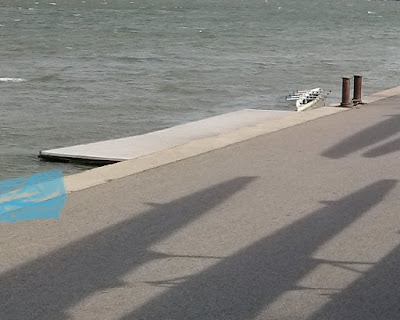play at running
"Man shares a great deal with the other animals, whose enjoyment of play can astonish us - so much so that anyone who observes and studies animal behaviour ... is overcome by a feeling of delight coupled by horror. ... So overwhelming was the impact of Descartes' central insight ... animals [then mankind] were simply considered to be automata ... enthusiasm [of free will] has utterly disappeared." - Hans Georg Gadamer, "The Play of Art"I think that runners can feel the delight and horror of free will: the delight at the breeze and the views, the horror at the pain on a return from a long out and back. To be a runner is also to play at something, to take Gadamer's definition where the freedom of play is most visible in art: in art and running, humans try things out, reject things, create - and what is made through this effort is hardly determined by ultility.
When was the last time you spent three hours on a treadmill since the roads were iced over and said: this was determined by ultility! (Even the 'run to get fit' answer is inapposite here: a better body could be sculpted in an hour on weights.) To run is to try: we don't really know where the mile after mile of training will lead us, hopefully not the sports clinic.
I wouldn't have thought to compare running to play were it not for an article called "How to Dress for the Game" by Pamela Hobart, which I thought was pertinent to runners - the obvious "costume" implications aside (most have their gear, and few and far between are runners like Jamil who can manage marathons in boardshorts).
The article is about how basic normcore tenets can be adopted by people to at once be themselves and be members of a community. Hobart uses the metaphor of role playing to explain this vision, which combats the "free-for-all" of "failed reactions to rapid change" with "world building". As I read the article, I wondered whether, to some extent, running has become so popular because it is being used to build worlds, to combat dissolving into apathy or the flow of the automatic. That very automatic that I began this post with - that stifles freeplay, which running is a form of.
I will adapt the points Hobart made about the problems we face in society that can be overcome by "games" to demonstrate some links between her article to running (I'll retain her headers, though I admit I did not relate to them):
Problem 1: SEEMING LIKE A CLONE.
Among runners, a quirk running style will not go unnoticed: whether it is a heel-strike, or a clenched fist, or T-Rex arms, or the anomaly of perfect grace, no one is a clone.
Problem 2: ISOLATION.
No runner can be so special that nobody knows what you’re talking about. New runners quickly learn the lingo of fartleks, DNFs, and "the mental game" - which spills over into life: once everyone has sweat together, given it their all, people can just be people, personality specialness and all.
Problem 3: MAXING OUT.
It may be impossible to keep up with the running news and latest studies (if one doesn't follow Ultrarunner Podcast's daily or Mountain Outhouse's weekly updates), but there is always room for yet another running blog to translate these experiences into the personal and local: because places and people are different (e.g. the logistics of running without cars, or how some run better hard three times a week, while others have to run every day), there can never be an end to particular takes on running in general.
There are so many other points in the article I'd like to respond to on many levels, but this is a running blog, so I'll leave the reference to that article with questions about how much running is play and whether running communities are "world building", creative outlets.
For example, if you, like me, are forced onto treadmills (because of the dearth of uniced pavement or trails, and lack of special running shoes), maybe you can draw inspiration from Gadamer's description of "what if". ...At least I find it refreshing to remind myself as I stare at myself in the gym mirror for hours that my mind needs to remember the experience of pushing through that boredom, "as if" I were running the last miles of a marathon. Gadamer's "as if" appears in his description of art that shows what play looks like:
"[Art] has something of the 'as if' character that we recognize as an essential feature of the nature of play. It is a 'work' because it resembles something played." ...Running really does feel like work! And play!
No new photos because I am chained to the dreadmill for now.
Brush: Ewansim via deviantArt.






Comments
Post a Comment